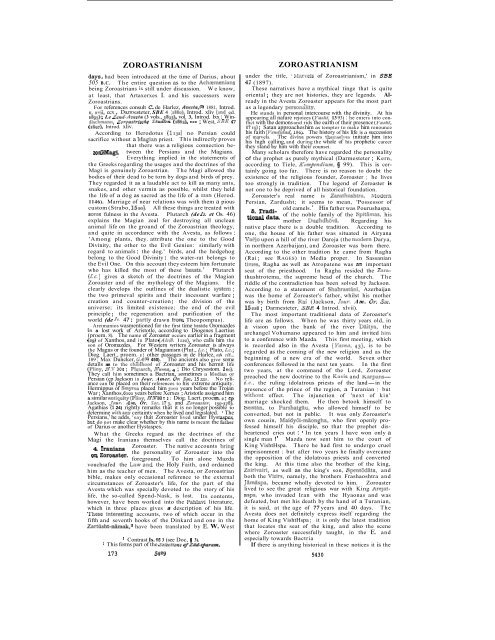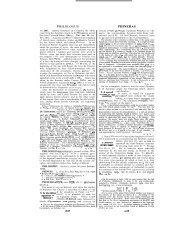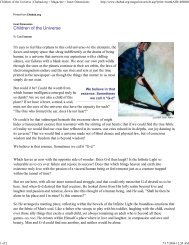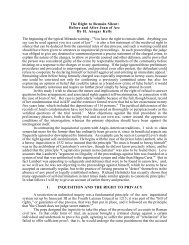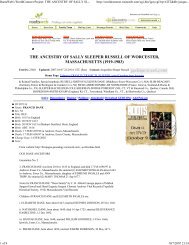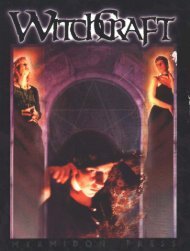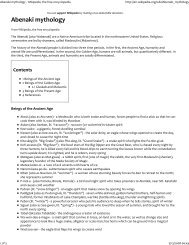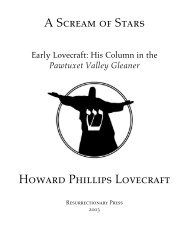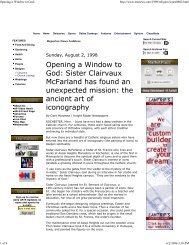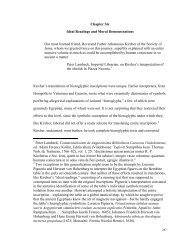Encylodaedia Biblica; a critical dictionary of the literary, political and ...
Encylodaedia Biblica; a critical dictionary of the literary, political and ...
Encylodaedia Biblica; a critical dictionary of the literary, political and ...
Create successful ePaper yourself
Turn your PDF publications into a flip-book with our unique Google optimized e-Paper software.
ZOROASTRIANISM<br />
days, had been introduced at <strong>the</strong> time <strong>of</strong> Darius, about<br />
505 B.C. The entire question as to <strong>the</strong> Achzmenians<br />
being Zoroastrians is still under discussion. We know,<br />
at least, that Artaxerxes I. <strong>and</strong> his successors were<br />
Zoroastrians.<br />
For references consult C. de Harlez, Auestu,P) 1881, Introd.<br />
x, xrii, ccx . Darmesteter, SBE 4 (1880), Introd. xliv (2nd ed.<br />
1895); Le ye%d-A-~estu (3 vols., !893), vol. 3, Introd. Ixx : Windischniann,<br />
Zovoastnkche Siudzen (1863), 121 ; West, SBE 47<br />
(r8g7), Introd. xliv.<br />
According to Herodotus (1132) no Persian could<br />
sacrifice without a Magian priest. This indirectly proves<br />
that <strong>the</strong>re was a religious connection be-<br />
3. GCreeka<br />
1 Contrast Is. 66 3 (see Doc, 5 3).<br />
2 This forms part <strong>of</strong> <strong>the</strong> SeZections <strong>of</strong>Z~-spurum.<br />
173 5429<br />
ZOROASTRIANISM<br />
under <strong>the</strong> title, ' Marvels <strong>of</strong> Zoroastrianism,' in SBE<br />
47 (1897).<br />
These narratives have a mythical tinge that is quite<br />
oriental ; <strong>the</strong>y are not histories, <strong>the</strong>y are legends. Already<br />
in <strong>the</strong> Avesta Zoroaster appears for <strong>the</strong> most part<br />
as a legendary persondity.<br />
tween <strong>the</strong> Persians <strong>and</strong> <strong>the</strong> Magians.<br />
On Mae* Everything implied in <strong>the</strong> statements <strong>of</strong><br />
He st<strong>and</strong>s in personal intercourse with <strong>the</strong> divinity. At his<br />
appearing all nature rejoices (Ymht, 13 93) : he enters into conflict<br />
with <strong>the</strong> demons <strong>and</strong> rids <strong>the</strong> earth <strong>of</strong> <strong>the</strong>ir presence (Yasht,<br />
17 19) ; Satan approaches him as tempter to make him renounce<br />
his faith (Vendidud 196). The history <strong>of</strong> his life is a succession<br />
<strong>of</strong> marvels. The hivine powers <strong>the</strong>mselves initiate him into<br />
his high calling, <strong>and</strong> during <strong>the</strong> whole <strong>of</strong> his prophetic career<br />
<strong>the</strong>y st<strong>and</strong> by him with <strong>the</strong>ir counsei.<br />
Many scholars <strong>the</strong>refore have regarded <strong>the</strong> personality<br />
<strong>of</strong> <strong>the</strong> prophet as purely mythical (Darmesteter ; Kern,<br />
<strong>the</strong> Greeks regarding <strong>the</strong> usages <strong>and</strong> <strong>the</strong> doctrines <strong>of</strong> <strong>the</strong> according to Tiele, Kompendium, § 99). This is cer-<br />
Magi is genuinely Zoroastrian. The Magi allowed <strong>the</strong> tainly going too far. There is no reason to doubt <strong>the</strong><br />
bodies <strong>of</strong> <strong>the</strong>ir dead to be torn by dogs <strong>and</strong> birds <strong>of</strong> prey. existence <strong>of</strong> <strong>the</strong> religious founder, Zoroaster ; he lives<br />
They regarded it as a laudable act to kill as many ants, too strongly in tradition. The legend <strong>of</strong> Zoroaster is<br />
snakes, <strong>and</strong> o<strong>the</strong>r vermin as possible, whilst <strong>the</strong>y held not one to be deprived <strong>of</strong> all historical foundation.<br />
<strong>the</strong> life <strong>of</strong> a dog as sacred as <strong>the</strong> life <strong>of</strong> a man (Herod.<br />
1146). Marriage <strong>of</strong> near relations was with <strong>the</strong>m a pious<br />
custom (Strabo, 1520). All <strong>the</strong>se things are treated with<br />
some fulness in <strong>the</strong> Avesta. Plutarch (de 13. et Os. 46)<br />
Zoroaster's real name is Zarathushtra, Modern<br />
Persian, Zardusht; it seems to mean, 'Possessor <strong>of</strong><br />
5. Tradi- old camels. ' His fa<strong>the</strong>r was Pourushaspa,<br />
tional data. <strong>of</strong> <strong>the</strong> noble family <strong>of</strong> <strong>the</strong> Spitamas, his<br />
explains <strong>the</strong> Magian zeal for destroying all unclean<br />
mo<strong>the</strong>r DughdhBvH. Regarding his<br />
animal life on <strong>the</strong> ground <strong>of</strong> <strong>the</strong> Zoroastrian <strong>the</strong>ology, native place <strong>the</strong>re is a double tradition. According to<br />
<strong>and</strong> quite in accordance with <strong>the</strong> Avesta, as follows : one, <strong>the</strong> house <strong>of</strong> his fa<strong>the</strong>r was situated in Airyana<br />
'Among plants, <strong>the</strong>y. attribute <strong>the</strong> one to <strong>the</strong> Good Vat?jo upon a hill <strong>of</strong> <strong>the</strong> river Dareja (<strong>the</strong> modern Darya,<br />
Divinity, <strong>the</strong> o<strong>the</strong>r to <strong>the</strong> Evil Genius: similarly with in nor<strong>the</strong>rn Azerbaijan), <strong>and</strong> Zoroaster was born <strong>the</strong>re.<br />
regard to animals ; <strong>the</strong> dog.' birds, <strong>and</strong> <strong>the</strong> hedgehog According to <strong>the</strong> o<strong>the</strong>r tradition he came from Ragha<br />
belong to <strong>the</strong> Good Divinity ; <strong>the</strong> water-rat belongs to (Rai ; see RAGES) in Media proper. In Sassanian<br />
<strong>the</strong> Evil One. On this account <strong>the</strong>y esteem him fortunate<br />
who has killed <strong>the</strong> most <strong>of</strong> <strong>the</strong>se beasts.' Plutarch<br />
(2.6.) gives a sketch <strong>of</strong> <strong>the</strong> doctrines <strong>of</strong> <strong>the</strong> Magian<br />
times, Ragha as well as Atropatene was an important<br />
seat <strong>of</strong> <strong>the</strong> priesthood. In Ragha resided <strong>the</strong> Zarathushtrotema,<br />
<strong>the</strong> supreme head <strong>of</strong> <strong>the</strong> church. The<br />
Zoroaster <strong>and</strong> <strong>of</strong> <strong>the</strong> mythology <strong>of</strong> <strong>the</strong> Magians. He riddle <strong>of</strong> <strong>the</strong> contradiction has been solved by Jackson.<br />
clearly develops <strong>the</strong> outlines <strong>of</strong> <strong>the</strong> dualistic system ; According to a statement <strong>of</strong> Shahrastani, Azerbaijan<br />
<strong>the</strong> two primeval spirits <strong>and</strong> <strong>the</strong>ir incessant warfare ; was <strong>the</strong> home <strong>of</strong> Zoroaster's fa<strong>the</strong>r, whilst his mo<strong>the</strong>r<br />
creation <strong>and</strong> counter-creation ; <strong>the</strong> division <strong>of</strong> <strong>the</strong> was by birth from Rai (Jackson, four. Am. Of-. Soc.<br />
universe; its limited existence; <strong>the</strong> end <strong>of</strong> <strong>the</strong> evil 15228 ; Darmesteter, SBE 4 Introd. xlvii).<br />
principle ; <strong>the</strong> regeneration <strong>and</strong> purification <strong>of</strong> <strong>the</strong><br />
world (de Is. 47 ; p:utly drawn from Theopompus).<br />
Areimanios wasmentioned for <strong>the</strong> first time beside Oromazdes<br />
in a lost work <strong>of</strong> Aristotle, according to Diogenes Laertius<br />
(proem. 8). The name <strong>of</strong> Zoroaster occurs earlier in a fragment<br />
(29) <strong>of</strong> Xanthos, <strong>and</strong> in Plato (Alcid. 1 122)) who calls him <strong>the</strong><br />
son <strong>of</strong> Oromazdes. For Western writers Zoroaster is always<br />
<strong>the</strong> Magus or <strong>the</strong> founder <strong>of</strong> Magianism (Plut., 2.c.; Plato, Lc.;<br />
Diog. Laert., proem. z : o<strong>the</strong>r passages in de Harlez, op. cit.,<br />
189 :, Max Duncker, ,GAP) 450). The ancients also give some<br />
details as to <strong>the</strong> childhood <strong>of</strong> Zoroaster <strong>and</strong> his hermit life<br />
(Pliny, H.V 30 2 ; Plutarch, Numu, 4 ; Dio Chrysostom. 2 60).<br />
They call him sometimes a Bactrian sometimes a Median or<br />
Persian (cp Jackson in Jour. Amer. 6, Soc. 15 222). No reliance<br />
can be placed on <strong>the</strong>ir references to his extreme antiquity.<br />
Hermippus <strong>of</strong> Smyrna placed him 5000 years before <strong>the</strong> Trojan<br />
War ; Xanthos, doao years before Xerxes ; Aristotle assigned him<br />
a similar antiquity(Pliny, "30 I 2 ; Diog. Laert. proem. 2 ; c<br />
Jackson, Jour. Am. Or. SOC. 173, <strong>and</strong> Zoroaster, 15o-r78f<br />
Agathias (2 24) rightly remarks that it is no longer possible to<br />
determine withany certainty when he lived <strong>and</strong> legislated. ' The<br />
Persians,' he adds, 'say that Zoroaster lived under Hystaspes<br />
but do not make clear whe<strong>the</strong>r by this name is meant <strong>the</strong> fa<strong>the</strong>;<br />
<strong>of</strong> Darius or ano<strong>the</strong>r Hystaspes.<br />
What <strong>the</strong> Greeks regard as <strong>the</strong> doctrines <strong>of</strong> <strong>the</strong><br />
Magi <strong>the</strong> Iranians <strong>the</strong>mselves call <strong>the</strong> doctrines <strong>of</strong><br />
4. Iranians Zoroaster. The native accounts bring<br />
on Zoroaster. <strong>the</strong> personality <strong>of</strong> Zoroaster into <strong>the</strong><br />
foreground. To him alone Mazda<br />
vouchsafed <strong>the</strong> Law<strong>and</strong> <strong>the</strong> Holy Faith, <strong>and</strong> ordained<br />
him as <strong>the</strong> teacher <strong>of</strong> men. The Avesta, or Zoroastrian<br />
bible, makes only occasional reference to <strong>the</strong> external<br />
The most important traditional data <strong>of</strong> Zoroaster's<br />
life are as follows. When he was thirty years old, in<br />
a vision upon <strong>the</strong> bank <strong>of</strong> <strong>the</strong> river DHitya, <strong>the</strong><br />
archangel Vohumano appeared to him <strong>and</strong> invited him<br />
to a conference with Mazda. This first meeting, which<br />
is recorded also in <strong>the</strong> Avesta (Ymna, 43), is to be<br />
regarded as <strong>the</strong> coming <strong>of</strong> <strong>the</strong> new religion <strong>and</strong> as <strong>the</strong><br />
beginning <strong>of</strong> a new era <strong>of</strong> <strong>the</strong> world. Seven o<strong>the</strong>r<br />
conferences followed in <strong>the</strong> next ten years. In <strong>the</strong> first<br />
two years, at <strong>the</strong> comm<strong>and</strong> <strong>of</strong> <strong>the</strong> Lord, Zoroaster<br />
preached <strong>the</strong> new doctrine to <strong>the</strong> Kavis <strong>and</strong> Karpans-<br />
Le., <strong>the</strong> ruling idolatrous priests <strong>of</strong> <strong>the</strong> l<strong>and</strong>-in <strong>the</strong><br />
presence <strong>of</strong> <strong>the</strong> prince <strong>of</strong> <strong>the</strong> region, a Turanian ; but<br />
withont effect. The injunction <strong>of</strong> 'next <strong>of</strong> kin'<br />
marriage shocked <strong>the</strong>m. He <strong>the</strong>n betook himself to<br />
SeistHn. to ParshatgHu, who allowed himself to be<br />
converted, but not in public. It was only Zoroaster's<br />
own cousin, Maidybi-mHongha, who first openly pr<strong>of</strong>essed<br />
himself his disciple, so that <strong>the</strong> prophet disheartened<br />
cries out : e In ten years I have won only a<br />
single man ! ' Mazda now sent him to <strong>the</strong> court <strong>of</strong><br />
King VishtHspa. There he had first to undergo cruel<br />
imprisonment ; but after two years he finally overcame<br />
<strong>the</strong> opposition <strong>of</strong> <strong>the</strong> idolatrous priests <strong>and</strong> converted<br />
<strong>the</strong> king. At this time also <strong>the</strong> bro<strong>the</strong>r <strong>of</strong> <strong>the</strong> king,<br />
Zairivairi, as well as <strong>the</strong> king's son, SpentbdZta, <strong>and</strong><br />
both <strong>the</strong> Vizirs, namely, <strong>the</strong> bro<strong>the</strong>rs Frashaoshtra <strong>and</strong><br />
circumstances <strong>of</strong> Zoroaster's life, for <strong>the</strong> part <strong>of</strong> <strong>the</strong> JZmHspa, became wholly devoted to him. Zoroaster<br />
Avesta which was specially devoted to <strong>the</strong> story <strong>of</strong> his lived to see <strong>the</strong> great religious war with King Arejatlife,<br />
<strong>the</strong> so-called Spend-Nask, is lost. Its contents,<br />
however, have been worked into <strong>the</strong> Pahlavi literature,<br />
which in three places gives a description <strong>of</strong> his life.<br />
aspa, who invaded Iran with <strong>the</strong> Hyaonas <strong>and</strong> was<br />
defeated, but met his death by <strong>the</strong> h<strong>and</strong> <strong>of</strong> a Turanian,<br />
it is said, at <strong>the</strong> age <strong>of</strong> 77 years <strong>and</strong> 40 days. The<br />
These interesting accounts, two <strong>of</strong> which occur in <strong>the</strong><br />
fifth <strong>and</strong> seventh hooks <strong>of</strong> <strong>the</strong> Dinkard <strong>and</strong> one in <strong>the</strong><br />
Zartfisht-niimak,2 have been translated by E. W. West<br />
Avesta does not definitely express itself regarding <strong>the</strong><br />
home <strong>of</strong> King VishtHspa : it is only <strong>the</strong> latest tradition<br />
that locates <strong>the</strong> seat <strong>of</strong> <strong>the</strong> king, <strong>and</strong> also <strong>the</strong> scene<br />
where Zoroaster successfully taught, in <strong>the</strong> E. <strong>and</strong><br />
especially towards Bactria<br />
If <strong>the</strong>re is anything historical in <strong>the</strong>se notices it is <strong>the</strong><br />
5430


